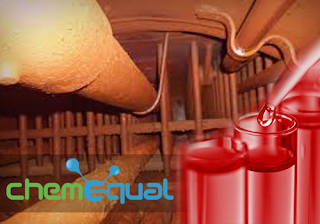Tropical coolants are water based need coolant additives for mineral
salt suppression that may negatively affect heat transfer operations and
corrode/scale inner walls of cooling systems. The Cooling System is itself a
very aggressive environment and is subjected to a small volume of coolant that
is propelled through the system at very high velocity at extremes of
temperatures that can easily cause scaling and corrosion to metal components
leading to equipment failure at any time.
NALCOOL 2000 manufactured by
NALCO is a coolant corrosion inhibitor blend made from
Sodium Nitrite, Sodium Tetraborate, Sodium Metasilicate, Sodium
Mercaptobenzothiazole that functions as a protective, film-forming corrosion
inhibitor and scale suppressant to keep engines clean and free from scale, and
reduces downtime and maintenance costs. The product protects cooling systems
against corrosion, liner pitting, cavitation-erosion, mineral scale deposits
and electrolysis. In addition, it helps reduce the effect of oxidizing agents
that are commonly dissolved in most tropical coolants.
It has been designed for all common
engine cooling systems and is ideal to protect ferrous metals, copper & its
alloys, aluminium etc. as well as rubber gaskets, ‘O’rings and non-metallic
components within the cooling system. NALCOOL 2000 is available in liquid form
making it easy to use and apply, fully compatible with water based coolants and
Mono Ethylene Glycol antifreeze. It is chromate
free and has been tested internationally to maintain a high degree of heat
transfer efficiency & long engine life.
Product Features & Benefits:
s
Designed
to protect cast iron diesel engine cooling systems
s
Contains
additives to protect against sludge and mineral scale formation
s
Prevents
overheating
s
Effective
against liner pitting and cavitation erosion
s
Liquid,
safe & easy to apply formulation
s
Not
harmful to radiator or heater connecting hoses, diesel liner seals and ‘O’rings
s
Recommended
and used by major diesel engine manufacturers throughout the world
NALFLEET NALCOOL 2000 is the perfect
corrosion & scale inhibitor for all types of heat transfer fluids in small
auxiliary diesel engines containing aluminium components.
ChemEqual is a vast online specialty chemical database
and NALCOOL 2000 and equivalent compositions of coolant corrosion inhibitors can be searched here from among a wide range of
global suppliers.











